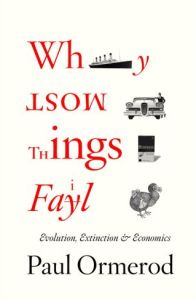Rejoignez getAbstract pour lire le résumé !

Rejoignez getAbstract pour lire le résumé !
Paul Ormerod
Why Most Things Fail
Evolution, Extinction and Economics
Pantheon Books, 2005
Aperçu
Evolutionary biology may reveal more about business failures than random economics explains.
Recommendation
This excellent, short work by Paul Ormerod is a worthy successor to his remarkably successful Butterfly Economics. As he did in that work, he draws here on lessons from biology to explain phenomena in economics. He covers a wide range of subjects, time periods and theories, all tied together (though not without some straining at the rope) by an inquiry into failure. Although Ormerod makes every effort to keep the work accessible, that scarcely makes it is easy reading. Readers who lack at least a nodding acquaintance with scientific writings and economic studies may find this hard slogging indeed. With that caveat, getAbstract thinks that readers who have a background in this field should pay serious attention to Ormerod’s ideas. The notion that failure is inherent and inevitable for many systems ought to guide business strategies and - especially - government regulation.
Summary
About the Author
Paul Ormerod was the head of the economic assessment unit at The Economist and the director of economics at the Henley Center for Forecasting in England. He taught economics at the universities of London and Manchester, and was a founder of a major consulting firm.









Comment on this summary